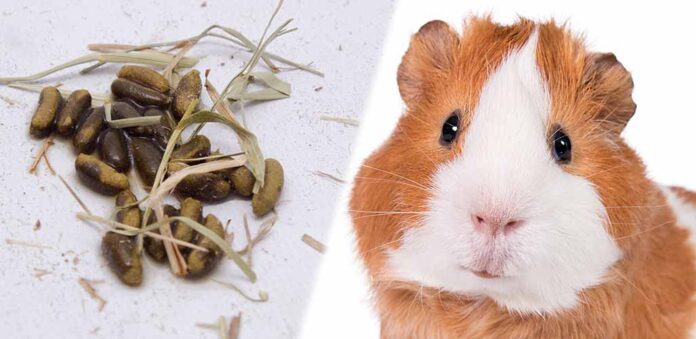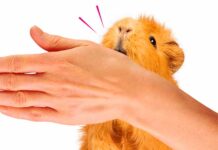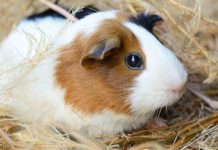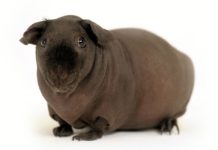This article answers a common cavy question: why do guinea pigs eat their poop? If you’ve clocked your pet carrying out this questionable behavior, don’t worry, it’s normal and actually a good thing. We’ll explain why.
- Why do guinea pigs eat their own poop?
- Is it normal for guinea pigs to eat their poop?
- How often do guinea pigs poop
- Why do guinea pigs poop so much?
- Guinea pig impaction and other poop problems
Guinea pigs have evolved a special mechanism for digesting tough plant fibers by eating them twice. They produce two types of poop – a soft wet poop which they reconsume, and a hard, dry poop which they leave.
These guinea pigs are enjoying a tasty parsley snack. And in a few hours, they’re going to eat the exact same serving again. Let’s find out why that’s so important for guinea pig health.
Why do guinea pigs eat their poop?
Guinea pigs eat some of their poop as a means of getting as much energy and nutrition as possible from grasses and other plant matter. You might sometimes hear this referred to as coprophagy, which means eating feces. But a more accurate description is cecotrophy. Cecotrophy mean eating cecotrophs – the semi-digested food that has only passed once through a guinea pig’s digestive system. Coprophagy would mean eating the fully digested pellets that have been through their digestive system twice. Guinea pigs do not do this.
Guinea pigs aren’t the only animals which rely on cecotrophy to extract sufficient energy from their diet. It’s a common trait of lots of herbivores species, including horses, capybara, rabbits, lemmings, chinchillas, rats and mice. You’ll notice that most of those animals are small, and that’s because small animals need proportionally more calories and protein than large herbivores to sustain them. For example, being small means they lose heat quicker and need more energy to keep warm. So, it’s especially important that they get as much nourishment as possible from their diet. But, grasses and hay (wild make up most of a guinea pig’s natural diet) are high in cellulose – one of the hardest carbohydrates to break down and get energy from. So they’ve adapted a number of ways to get the most out of it:
1) Selective grazing
Whether grazing on the lawn, or rummaging through their food bowl, guinea pigs always start by eating the youngest, tenderest shoots first. These are easiest to digest, and denser in nutrients than older, tougher growth.
2) They have a large cecum
A cecum is a chamber between the small and large intestine which contains a large population of bacteria that help break down plant fibers. Baby guinea pigs populate their cecum with plant-digesting bacteria by eating their mom’s cecotrophs. Those first bacteria rapidly multiply to form a huge colony in the baby guinea pigs’ cecum, and both species will rely on that symbiotic relationship for the guinea pigs’ whole life.
3) They produce two kinds of poop
A guinea pig’s feeding strategy basically boils down to eating everything twice to give their digestive system a second shot at extracting energy, protein, vitamins and minerals from their diet. The first time they eat a meal, it exits the body as soft poops called cecotrophs (because they were formed by bacterial digestion in the cecum). They eat these again, directly from their anus. After they have digested the cecotrophs a second time, they eliminate the leftover waste matter as hard, dry pellets. That’s the guinea pig poop you find scattered on the floor of their habitat when you clean them out.
Is it normal for guinea pigs to eat their poop?
Eating cecotrophs is a normal and important part of guinea pig behavior. Cecotrophs still contain proteins and nutrients such as vitamin B, which the guinea pigs wasn’t able to absorb on the first pass through the digestive system. In studies where guinea pigs were prevented from eating their cecotrophs, they lost weight and became malnourished.
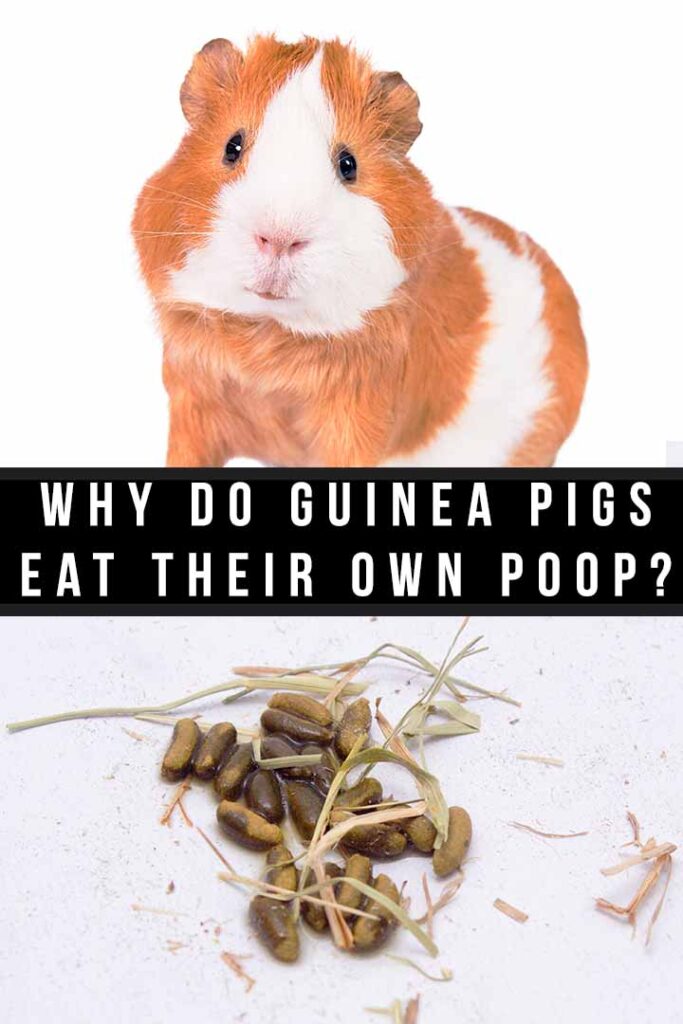
Two types of poop eating aren’t normal for guinea pigs though:
- Eating their feces – the hard, dry pellets produced after digesting the cecotrophs a second time.
- And eating other animals’ feces – for example if they are housed together with rabbits.
Both of these behaviors can make a cavy sick, so if you spot a guinea pig eating poop belonging to another animal, separate them and get veterinary attention. Likewise, call the vet if they start eating their own hard dry fecal pellets.
How often do guinea pigs poop?
Guinea pigs have diurnal eating habits, which means they eat the most at dawn and dusk. But you’ll often spot them grazing in between those times too. Especially indoor guinea pigs who have learned they don’t need to worry about predators.
It takes about 5 hours for a guinea pig’s meal to complete its journey through their digestive tract, and be left on the hutch floor as fecal pellets. So, whilst they tend to be very discreet and private about eating their cecotrophs, the times you’re most likely to spot it happening are 2-3 hours after dawn, and 2-3 hours after dusk, whilst resting.
If your indoor guinea pig has a habit of grazing intermittently all day long, you’ll probably notice that they seem to poop intermittently all day long too!
Why do guinea pigs poop so much?
There are a couple of reasons why guinea pigs poop so much. Firstly, they have to process a large volume of food in order to get the energy they need. As we’ve already seen, this is partly due to their size – they need a lot of energy for bodily functions like keeping warm.
Secondly, the guinea pig’s digestive system is adapted to be always in motion. If it runs empty even briefly, it can grind to a halt altogether – a condition called gastric stasis. When this happens, it won’t simply start up again as soon as the guinea pig eats another meal – in fact the guinea pig may start refusing food altogether. Guinea pigs with gastric stasis need urgent medical attention to get their digestive system moving again. So if you notice your pet has stopped eating, or stopped pooping, it’s time to call a vet.
Guinea pig impaction and other poop problems
Gastric stasis is one reason a guinea pig might stop producing and eating their cecotrophs, but it’s not the only one. In fact, problems with diet or cecotrophy are a common reason for guinea pigs needing veterinary attention. Here are some other poop-related problems:
- Obesity. Guinea pigs eat their cecotrophs directly from their anus, and being overweight can obstruct that. Since guinea pigs have adapted to graze frequently on low-energy foods, they are prone to gaining weight if their diet is too energy-dense instead.
- Polycystic ovaries. A significant proportion of female guinea pigs have polycystic ovaries. This can cause their abdomen to swell, especially during breeding season. Extreme swelling can make it uncomfortable or impossible to eat their cecotrophs.
- Anal impaction. Anal impaction occurs in elderly guinea pigs, when the muscles around the anus become loose, and they have difficulty expelling cecotrophs and feces.
All of these problems need prompt veterinary attention, or they will become life-threatening. So if you have a guinea pig not pooping as much, or leaving cecotrophs on the hutch floor rather than eating them, get medical advice right away.
Why do guinea pigs eat their poop – summary
Producing and eating soft poops called cecotrophs is an important survival adaptation which enables guinea pigs to survive on an energy-poor diet of grass and other vegetation. Guinea pigs usually consume their cecotrophs whilst resting in a den during the middle of the day or night. So it’s likely you’ll never see them. If your guinea pig does start leaving uneaten cecotrophs on the hutch floor, get them checked by a veterinarian immediately. And congratulations, you are now an expert on guinea pig poop!
Don’t miss
- Why Do Guinea Pigs Nibble You?
- How Long Does It Take To Tame A Guinea Pig?
- Can Guinea Pigs Eat Pumpkin?
- When Do Guinea Pigs Sleep?
- Baytril for Guinea Pigs
References
Donnelly & Brown. Guinea pig and chinchilla care and husbandry. Veterinary Clinics: Exotic Animal Practice. 2004.
Elfers et al. Good to Know: Baseline Data on Feed Intake, Fecal Pellet Output and Intestinal Transit Time in Guinea Pig as a Frequently Used Model in Gastrointestinal Research. Animals. 2021.
Garner-Richardson. Guinea pig nutrition. The Veterinary Nurse. 2013.
Pollock. Behavior Essentials: The Guinea Pig. LafeberVet. 2017.
Sakaguchi. Digestive strategies of small hindgut fermenters. Animal Science Journal. 2003.

